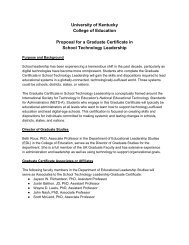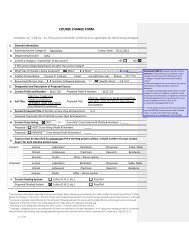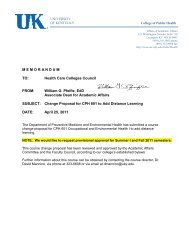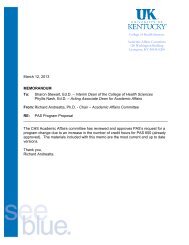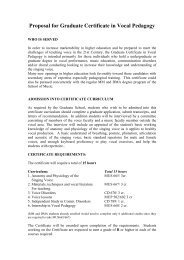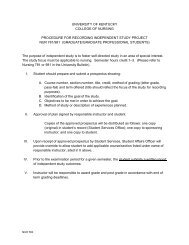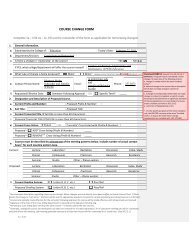CPH 605 - University of Kentucky
CPH 605 - University of Kentucky
CPH 605 - University of Kentucky
Create successful ePaper yourself
Turn your PDF publications into a flip-book with our unique Google optimized e-Paper software.
In relationship to the Dr.P.H. degree, this course contributes toward fulfillment <strong>of</strong> the following<br />
terminal objectives for students concentrating in epidemiology.<br />
1. Explain and apply the principles and methods <strong>of</strong> epidemiology in a wide variety <strong>of</strong><br />
clinical, community, environmental and public health situations.<br />
2. Search, critically review, and synthesize and interpret the epidemiologic and public<br />
health literature to impact public health policy.<br />
3. Identify and employ appropriate epidemiologic study designs to develop fundable<br />
epidemiologic and public health programs.<br />
4. Direct the collection, compilation, and management <strong>of</strong> epidemiologic data for<br />
surveillance and investigation <strong>of</strong> epidemiologic issues.<br />
5. Direct the analysis <strong>of</strong> epidemiologic data using advanced statistical methods.<br />
6. Interpret and clearly communicate complicated epidemiological findings to<br />
collaborators, legislators, administrators, and the public to effect public health<br />
policy.<br />
7. Summarize and assess ethical issues that confront epidemiology and public health<br />
and integrate appropriate strategies to resolve those issues.<br />
8. Effectively lead, educate, and mentor students, coalitions, clinicians, legislators,<br />
administrators, public health practitioners, and other persons to utilize<br />
epidemiological data, methods and findings to impact public health and public health<br />
practice.<br />
Course Goals/Objectives:<br />
After completion <strong>of</strong> this course in Introduction to Epidemiology the student will be able to:<br />
1. Explain the purpose and application <strong>of</strong> epidemiology, and differentiate between a clinical<br />
and an epidemiological approach to disease and prevention.<br />
2. Identify the contributions <strong>of</strong> biology, statistics, demography, and sociology as they relate to<br />
the science <strong>of</strong> epidemiology.<br />
3. Demonstrate an understanding <strong>of</strong> how data are collected, grouped and analyzed in<br />
epidemiologic studies, including the incidence and prevalence <strong>of</strong> disease and mortality rate<br />
standardization.<br />
4. Identify and use appropriate epidemiological principles and study designs in the<br />
interpretation <strong>of</strong> epidemiologic investigations and in the formulation <strong>of</strong> epidemiologic<br />
research questions.<br />
5. Differentiate between the following study designs in terms <strong>of</strong> validity, cost, bias,<br />
advantages and disadvantages. (a) cross-sectional studies; (b) ecologic studies (c)<br />
case-control; (d) cohort; (e) randomized clinical trials; and (f) community trials.<br />
6. Identify sources <strong>of</strong> confounding, bias, and effect modification in epidemiological studies<br />
7. Assess the ethical issues and procedures that are confronted in the conduct <strong>of</strong><br />
epidemiologic studies<br />
This course relates directly to the accomplishment <strong>of</strong> the educational program goals for the<br />
M.P.H. and Dr.P.H. degrees. The MPH goal and objectives are described in the Student<br />
Handbook which students received upon enrollment into the MPH degree program. Similarly,<br />
the Dr.P.H. goal and objectives are described in the Student Handbook which students receive




